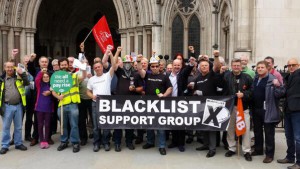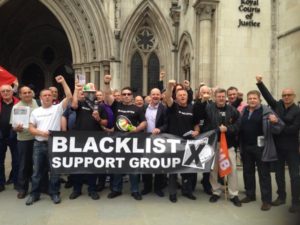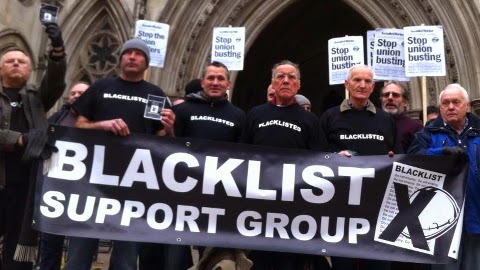Spycop Boss Sues Blacklisted Workers

Gordon Mills, one of the spycops chiefs, is suing workers who spycops helped to illegally blacklist.
The extraordinary move follows a letter from John McDonnell MP to Home Secretary Theresa May concerning Mills giving a Powerpoint presentation to a meeting of corporate bosses and an illegal blacklisting firm.
BLACKLISTING
The Consulting Association ran an illegal blacklist of over 3,000 construction workers until it was raided and closed by the Information Commissioners Office in 2009. It helped firms to filter out job applicants who had a history of being ‘trouble makers’ wanting proper health and safety equipment, union membership, or other things that are their protected rights.
Most of the big name construction firms illegally used the list – Skanska & McAlpine were invoiced for around 14,000 vetting checks in the blacklist’s final year 2008-09 when they were both building Olympic venues – but no firm has yet faced any charges or censure apart from a solitary letter telling them not to do it again.
In 2012 it was realised that some of the information on the files must have come from the police or MI5. The following year the Independent Police Complaints Commission said it seemed every constabulary’s Special Branch had supplied the blacklist with information.
Some of this information bore no relevance to the job, and instead concerned the person’s political opinions or friendships. Around 200 environmental activists had their details given to the Consulting Associationj by police. Another person, a teacher by trade, was on the list for having been seen by police at an anti-racist demonstration.
This is not police officers upholding the law, it is police officers breaking the law to uphold something they presumably feel is more important; upholding corporate power.
NETCU
After the second British political secret police unit, the National Public Order Intelligence Unit, was established in 1999, a sister unit was devised in 2004 to support companies that were the subject of protests. The National Extremism Tactical Co-ordination Unit (NETCU) was born.
NETCU was established during the drafting of the 2005 amendment to the Serious Organised Crime and Police Act which made it illegal to ‘interfere with the contractual relations of an animal research organisation’ or to ‘intimidate’ employees of an animal research organisation. Run from Huntingdon in Cambridgeshire, NETCU’s remit was defined as ‘prevention’ and it was tasked with helping companies such as Huntingdon Life Sciences frustrate campaigns waged against them by animal rights activists.
NETCU didn’t just advise corporations about threats to their profits from campaigns, it took a proactive political role in discrediting and undermining those campaigns. Its website linked to the pro-vivisection Research Defence Society, and the unit issued several press releases boasting of activists being prevented from doing street collections.
NETCU’s rapid ‘mission-creep’ saw it move to encompass environmental and climate activists.
SUPPORTING CORPORATIONS IN COURT
After the Protection from Harassment Act 1997 came into force, enterprising lawyer Timothy Lawson-Cruttenden realised that, as well as its intended purpose of protecting vulnerable women from dangerous ex-partners, it could also be used to defend multinational corporations from protest. A large number of injunctions were served against various campaigns, and Lawson-Cruttenden was behind most of them. He developed strong relationships with police officers.
Regfarding the campaign against arms manufacturers EDO and Caterpillar, the Guardian reported that in 2005,
‘Private emails show that Inspector Nic Clay and Jim Sheldrake of NETCU gave Lawson-Cruttenden the names and contact details of officers at two other police forces as he was “keen” to obtain statements about the activities of the campaigners at a third firm.’
On that occasion, the arms firm lost and the judge severely criticised Lawson-Cruttenden for ignoring a court order against receiving confidential police documents. By the time of the Guardian report in 2009 the head of NETCU, Superintendent Stephen Pearl, who had testified in court for many of Lawson-Cruttenden’s corporate clients seeking injunctions, denied that NETCU were involved in any way.
BLACKLISTERS FIGHT BACK
John McDonnell MP has supported the blacklisted workers’ campaign for justice from the start – he hosted the inaugural meeting of the Blacklist Support Group. His prominence meant that he was the chosen recipient for a document leaked in 2014.
It was two handwritten pages from the man who ran the Consulting Association blacklist, Ian Kerr. It documented a meeting at the Bear Hotel, Woodstock, Oxfordshire, attended by Kerr, directors of construction firms using the blacklist and DCI Gordon Mills of NETCU (The Canary has published the original notes). At the meeting, Mills delivered a talk complete with Powerpoint presentation. The police have not released the contents of the presentation.
McDonnell wrote to Home Secretary Theresa May demanding publication of all relevant NETCU files, and an independent inquiry into blacklisting
‘DCI Mills was head of Police Liaison at NETCU and it is alleged that his role was to provide information from the police to companies. NETCU was subsequently subsumed into the National Domestic Extremism Unit of the Metropolitan Police, but despite numerous requests under the Freedom of Information Act for documents relating to NETCU’s activities, the response has been that no documents relating to the meeting of DCI Mills with the association exist.
It appears odd that no report of such an important meeting was written and that no evidence of the meeting is now held by the Metropolitan Police.’
Blacklist Support Group secretary Dave Smith, whose Consulting Association file was 36 pages long, and who recently co-authored the Blacklisted book, added
‘We have been saying for five-and-a half years that the state was involved in blacklisting and we have been told time and time again that is not true and been accused of being paranoid. It is a cover-up. We have a name of a senior police officer, not a rogue constable, who was meeting with them. There must be documentation held by the police and correspondence between the police and the association.’
Many blacklisted workers, and the Blacklisted Support Group itself, are among the 200 people designated core participants at the Undercover Policing Inquiry.
SUING THE PROTESTERS
So it comes as something of a surprise that Mills has, like his NETCU colleague Superintendent Pearl before him, chosen to deny everything. He told the Evening Standard
‘This attack on my integrity by John McDonnell has blighted my life, leaving me unable to move job and fearful for the safety of my family. In the past year I have been called a blacklister, a spy cop, a colluder and an undercover operative — all of which are untrue.’
That’s a bold stance for someone who was one of the officers who ran a spycop unit. The fear for his family is also a somewhat overblown. In five years since the spycops scandal hit the headlines we have learned the names and locations of many officers. Nothing untoward has happened to any of them.
Mills says the ‘highly damaging and serious allegation’ was ‘simply not true,’ adding that he had not even heard of the Consulting Association and its blacklist until he read about it in a newspaper in 2014. He singled McDonnell out for criticism
‘Mr McDonnell has never asked me for my account. I was named with what appears to be no consideration to my personal safety or the safety of my family against an extremist backlash…
With power comes responsibility. Mr McDonnell should think about the horrendous impact this has had on me and my family and apologise for initiating this campaign on an ex-police officer who was simply doing his job.’
A spokesperson for McDonnell replied that he
‘was well within his right to raise with the Home Secretary the matter of a serving police officer meeting an organisation that was involved in the illegal blacklisting of trade unionists, while this officer was working for a unit that kept union activists under surveillance’.
However, Mills is not suing McDonnell. Nor is he suing The Times, who published an interview with Consulting Association boss Ian Kerr (now deceased) who spoke of his links with police and the ‘two way information exchange’.
The sole target of Mills’ legal action is the GMB, who have given extensive legal support to blacklisted workers and helped to organise protests against blacklisters.
A CHANGE OF PLAN
In his claim against the GMB, Mills say it had been his
‘intention to develop and pursue an academic, teaching career exploiting his police experience and training’
In 2013 he published a candid essay aimed at fellow police strategists in entitled The successes and failures of policing animal rights extremism in the UK 2004–2010 as part of his work towards a doctorate. He gained this qualification at London Metropolitan University on a course run by a team including former spycop boss Bob Lambert.
Mills had a part time post at Anglia Ruskin University around that time. The GMB planned a series of demonstrations about blacklisting in March 2015, including one at Anglia Ruskin University. The university’s lawyers wrote to the GMB saying Mills’ employment there had ended in 2014 and there were no plans to renew it. The union framed this in terms of Mills being sacked and alluded to a blacklisting connection, which stretches the truth.
However, it’s clear that any future academic employer of Mills’ policing experience would be subject to demonstrations. Bob Lambert’s post at London Metropolitan University was, at the time, the subject of a campaign of monthly protests, and spycops campaigners had held meetings there and at Lambert’s other employer, the University of St Andrews. These were continued until Lambert resigned from both posts in December 2015. It seems likely that Mills and Lambert discussed all this.
As with Lambert, Mills fears the toll on his prestige and salary if he is held responsible for the unlawful actions of disgraced spycops.
No date has been set for the defamation hearing.
[The Undercover Research Group have produced a profile of Gordon Mills.]

 More than six years since the construction industry blacklist was exposed, firms involved have paid out millions to affected workers.
More than six years since the construction industry blacklist was exposed, firms involved have paid out millions to affected workers.